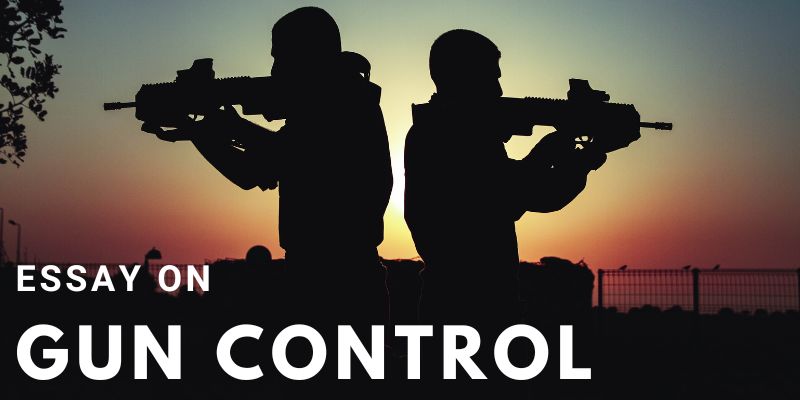Gun control is a highly debated and controversial topic around the world. In essence, it refers to efforts made to regulate the manufacture, sale, ownership, and use of firearms by private individuals. The primary aim of gun control is to prevent gun-related violence and protect the public from the misuse of firearms. However, opinions on the effectiveness and necessity of gun control vary widely.
Those in favor of gun control argue that it is essential to reduce gun-related violence and mass shootings, which have become a major concern in many countries. They suggest that strict regulations on gun ownership and use, such as background checks, licensing, and waiting periods, can help prevent criminals, mentally unstable individuals, and minors from obtaining firearms. Supporters of gun control also point to countries with strict gun laws, such as Japan and Australia, where gun-related deaths are significantly lower compared to countries with more relaxed gun laws.
On the other hand, opponents of gun control argue that it violates the Second Amendment of the US Constitution, which protects the right to bear arms. They argue that the vast majority of gun owners are responsible citizens who use their firearms for hunting, self-defense, and sport, and that gun control measures would only prevent law-abiding citizens from exercising their rights. Moreover, opponents suggest that criminals would still obtain guns illegally, regardless of any regulations in place.
In terms of statistics, research has shown that countries with stricter gun control laws tend to have lower rates of gun violence. For example, a study published in the Journal of the American Medical Association found that US states with stricter gun laws had lower rates of firearm deaths. Another study published in The Lancet found that Australia’s implementation of strict gun control laws in the late 1990s resulted in a significant reduction in firearm deaths.
However, opponents of gun control argue that correlation does not equal causation, and that other factors such as mental health, poverty, and social issues contribute to gun violence.
In conclusion, gun control remains a highly debated issue with valid arguments on both sides. However, it is clear that gun violence is a serious problem in many countries and requires careful consideration and action. As such, continued research and discussion on the topic is essential to find effective solutions to prevent gun-related deaths and injuries.
Here are some statistics on gun control:
- In 2020, there were over 43,000 gun-related deaths in the United States, including homicides, suicides, and accidental shootings (source: Gun Violence Archive).
- According to a study by the Centers for Disease Control and Prevention, on average, 109 people die by firearm-related suicide in the US every day.
- In a survey conducted by Pew Research Center, 89% of Americans support background checks for private gun sales and at gun shows.
- States with stricter gun laws have lower rates of gun-related deaths. For example, California has some of the strictest gun laws in the US and a gun-related death rate of 7.7 per 100,000 people, while Alaska has some of the most lenient gun laws and a gun-related death rate of 24.5 per 100,000 people (source: Everytown Research).
- In 2020, the United States saw a surge in gun sales, with over 23 million background checks conducted for gun purchases (source: FBI).
- A study published in the American Journal of Public Health found that states with mandatory waiting periods for gun purchases had a 17% lower gun homicide rate than states without waiting periods.
- The United States has the highest rate of gun ownership in the world, with an estimated 120 guns for every 100 residents (source: Small Arms Survey).
These statistics illustrate the ongoing debate around gun control and highlight the need for continued discussion and action to address the issue.
Here are some additional points to consider when discussing gun control:
- Mass shootings: The United States has had a disproportionately high number of mass shootings compared to other developed countries. According to the Gun Violence Archive, there were 615 mass shootings in the United States in 2020, with a total of 521 deaths and 2,541 injuries. This raises questions about the availability of guns in the United States and the need for stricter gun control laws.
- Suicide: In the United States, firearms are the most common method of suicide, accounting for nearly 50% of all suicides. This suggests that stricter gun control laws could potentially reduce the number of suicides.
- Domestic violence: Guns are often used in cases of domestic violence, and research has shown that domestic violence victims are more likely to be killed by their abusers if there is a gun in the home. Stricter gun control laws could help reduce domestic violence homicides.
- Police violence: The issue of police violence in the United States has been a major topic of discussion in recent years. Some argue that stricter gun control laws could reduce the likelihood of police using excessive force, as there would be fewer firearms in circulation.
- Second Amendment: One of the main arguments against gun control is that it goes against the Second Amendment of the United States Constitution, which guarantees the right to bear arms. Supporters of gun control argue that this amendment was written in a different time and that the right to bear arms should be balanced with the need for public safety.
- Illegal guns: Despite gun control laws, there are still many illegal guns in circulation. This raises questions about the effectiveness of gun control laws and the need for more comprehensive solutions to address gun violence.
- Mental health: Some argue that gun violence is not solely a result of gun availability, but also a result of mental health issues. Supporters of gun control argue that stricter gun control laws can help prevent those with mental health issues from accessing firearms, reducing the risk of gun violence.




